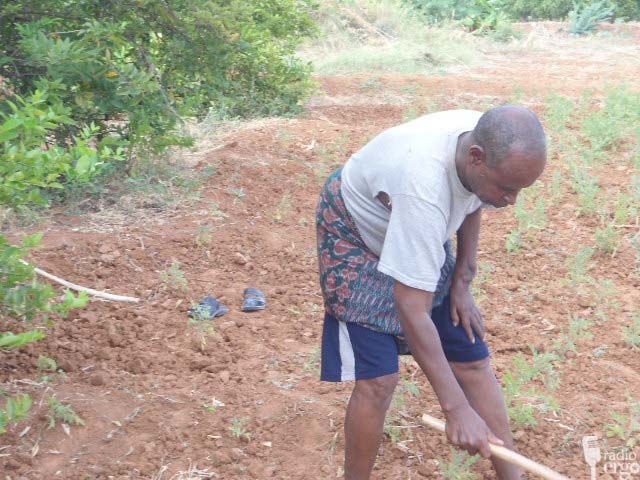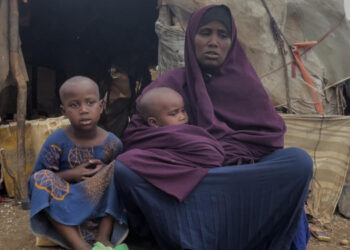(ERGO) – Over 100 families in Galgadud region, who were left destitute after drought wiped out their livestock, have successfully transitioned to farming and found a new source of livelihood.
These families, a mix of former pastoralists and long-time farmers, live in Faragoy, Duduma-cade, Ilaanle, and Marargur, whilst some are in internal displacement camps.
In both dry and rainy seasons, they are now harvesting a variety of vegetables and crops, which they sell in Dusamareb and surrounding areas. The steady income they earn from this new livelihood allows them to provide food, education, and other basic needs for their families.
Cadar Abdi Osman, a former pastoralist, started farming in February last year. Since then, she has had five harvests and earned nearly $1,000.
“My farm produces many crops, such as watermelon, beans, maize, tomatoes, peppers, and cabbage. It is more than enough for my life. Before, I was a pastoralist, and I didn’t know much about farming. When my livestock were wiped out, I was left in a dark place. Now, farming is the best thing for our lives because I get a good income from it,” she said.
Cadar is the sole provider for her six children and her elderly mother, having separated from the children’s father three years ago. Her two-hectare farm in Faragoy has been their lifeline. Before farming, her family was destitute, often struggling to get even one meal a day.
“My family now gets two or three cooked meals a day. We use some of the vegetables from the farm and buy other things we need. Our life is much better today, but there was a time when we had nothing after our livestock died, and we couldn’t even get one meal. At that time, we would ask for help from our neighbours and relatives. Farming has changed our lives so much. It covers all my burdens.”
The income from her farm has enabled Cadar to send two of her children to primary school for monthly fees of $14. In addition to food crops, she also grows livestock fodder, which she sells and uses to feed the 15 goats that survived the drought that killed off the rest of her herd. She earns about $150 every two months from selling the fodder.
“People who are regular customers buy fodder from me, and I also sell it in Dusamareb. I sell a bundle for a dollar, and it sells well every time. I used to be a pastoralist living in the countryside with 50 goats. The drought killed most of them, and I was left with just 15. Since livestock were no longer profitable, I turned to farming. The land where the farm is located is my land. I lived here before, and then I turned it into a farm,” she told Radio Ergo.
Norwegian Refugee Council (NRC) provided these families with seeds, training, simple farming tools, and a borehole for irrigation, with the aim of helping them become self-sufficient.
Naimo Ali Ibrahim also benefited from this project. She is part of a 30-person cooperative that shares a five-hectare farm in Dudumacadde area on the outskirts of Dusamareb.
Since 2024, they have had six harvests, including tomatoes, watermelon, bell peppers, maize, and fodder, which they sell to the local community. Naimo said she has been earning about $300 a month and has used the money to support her 10 children.
“It has changed my family’s life so much because with it you can buy rice, sugar, pasta, and oil. Now we are well-off. The farm means a lot to me. We want to get more help so we can become big farmers who export produce to other regions and districts,” she said.
Naimo, who was displaced from Lower Juba region in 2021 due to conflict, said the cooperative members do all the work themselves, including tilling, irrigating, harvesting, and selling the produce. They are a mix of long-time farmers and former pastoralists who were impoverished by the drought.
She used to support by begging. “Before, I was a destitute person who had nothing. I used to knock on people’s doors and ask, ‘Can I do your laundry?’ or ‘Can I fix your house?’ Whatever I earned, we would cook one meal at a time. But after I was included in the farming, thank God, we now cook two meals a day. In the morning, they have injera and cabbage, and at night, I cook rice or pasta. The farm has changed our lives so much.”
She is now the sole breadwinner for her family, and pays $60 a month for five of her children to attend Al-Mamun middle and high school. She still owes the school $180 from her difficult times, which she now plans to pay off.
According to Hirsi Farah Osman, the chairman of the Dusamareb farmers’ cooperative, many pastoralists have now become farmers after drought killed their livestock. He noted that the local farmers produce vegetables that were previously imported from southern Somalia, and the local produce is cheaper than the imported ones.
“People here did not know about farming; they used to be pastoralists, but their livestock were killed by droughts and conflicts. When we saw the problem, I and some other men from Mogadishu and Dusamareb decided to help our people escape the upcoming problem of hunger. People need to eat, and if their livestock are gone, they have to farm the land. A person who doesn’t farm the land will not be satiated,” Hirsi said.
The number of farms in Dusamareb and its surroundings has increased to over 400, Hirsi said, which shows a development in the region and a growing understanding of the importance of farming. A major challenge remains the lack of deep, non-seasonal wells, which require thousands of dollars to drill.











